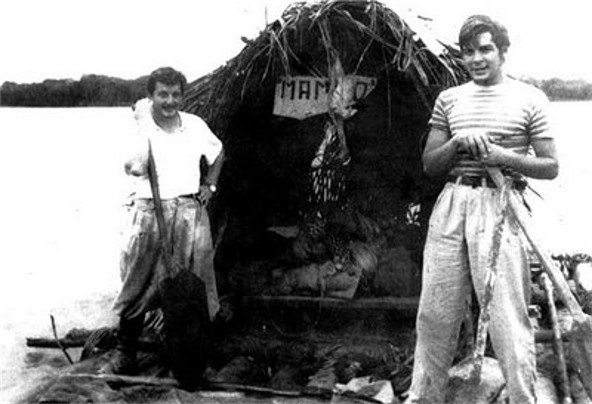In Marquez's speech, he talks about how Latin America has a terrible problem with oppression. In Spanish class, we recently watched a film called The Motorcycle Diaries. It is an adaptation of Che Guevara's autobiography about his journey throughout South America. You can view the trailer right here. Che Guevara was born in Argentina and was studying to become a doctor. Just before he finished his PhD, he went on a motorcycle trip around South America. Throughout this trip, he and his friend Alberto Granado helped a huge number of people living in terrible situations. Che sees the great atrocities that took place every day in South America during that time. After his motorcycle journey, his pursuit of making life better for the poor led him to Fidel Castro.
 |
| Guevara and Granado on a raft given to them by a leper colony they had cared for |
Guevera is respected by many prominent historical figures, such as Nelson Mandela. Although he is not viewed very favorably in the United States, he is still viewed as a hero in many parts of South America. No matter what your opinions of him are, Che Guevara serves as a shining example of just how much a person can do in their lifetime. Even to this day, a portrait of his face is still used as a symbol for leftist movements.



1 comment:
As a member of Luke's Spanish class, I agree with the comparison between Guevara and Marquez's speech. I think that Luke's connection is very insightful and creative. After thinking more about Luke's words, it is easy to see the similarity between the ideals of Guevara and Marquez. Marquez says, "A new and sweeping utopia of life, where no one will be able to decide for others how they die, where love will prove true and happiness be possible, and where the races condemned to one hundred years of solitude will have, at last and forever, a second opportunity on earth." On Guevara's journey, he sees the poor people of Latin America who are mistreated by the rich. For example, there is a farmer who was expelled from his farm by the landlord immediately after the crop was ready to be harvested and all the work was done. This is an example of the oppression and restricted freedom that Marquez talks about. Also, it is similar to how the banana farmers come into Macondo because they take over the town and restrict the freedom of the inhabitants.
Post a Comment